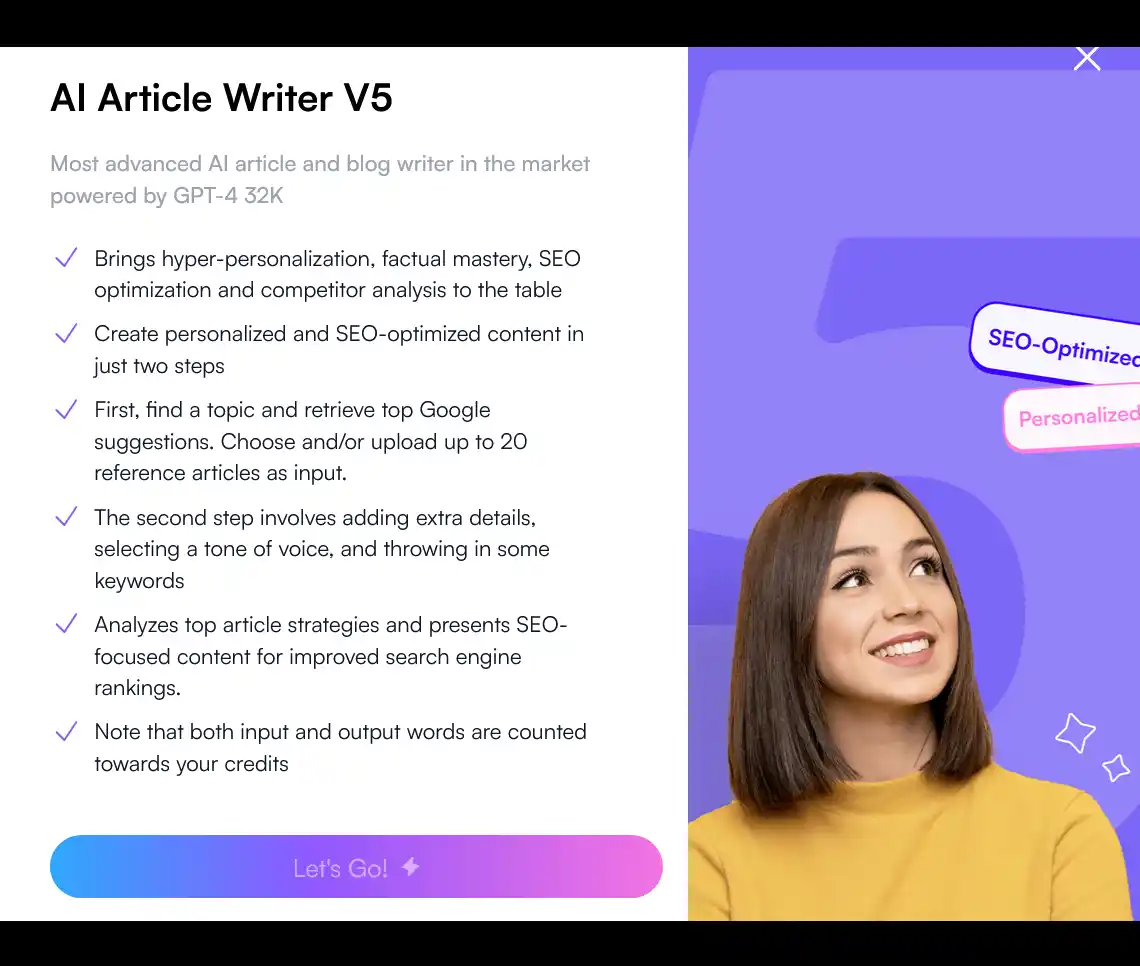It’s 2024, and it’s almost impossible to ignore the power of AI when it comes to content generation. More and more content creators and publishing houses are leveraging AI tools to scale their production.
In this article, we discuss 13 of the best AI tools for blogging. You can’t go wrong going with any of these tools, but here are our favorites:
AI tools for blogging
1) Koala
Koala is an AI writing and chatbot tool designed for SEO-optimized content creation.
It combines SERP analysis and real-time data with the advanced GPT-4 algorithm, enabling faster and more effective content creation.
Koala is web-based and integrates with platforms like ChatGPT, Google Drive, Slack, and Amazon Seller Central.
It offers various subscription plans, starting from as low as just $9/month, and is known for its one-click SEO optimization, versatility across platforms, real-time integrations, continuous improvement, and KoalaChat integration.
This is the tool I traded Jasper for.
Koala specializes in generating long-form content and can produce articles up to 2000 words within minutes.
It is particularly useful for bloggers, business owners on a budget, and affiliate marketers.
Other features:
- A Chatgpt-like feature, dubbed KoalaChat
- Bulk writing mode
- Support for GPT 3.5, GPT-4, and GPT-4 Turbo
Koala stands out for its ability to create detailed and relevant content, though it may still require editing for errors and fluff.
2) Content at Scale
Content at Scale is an AI writing tool designed for SEO content marketers, focusing on producing humanlike, long-form content at scale.
The platform offers a streamlined process for content creation, aiming to save time and cost compared to traditional content writing methods.
It integrates SEO insights and aims to produce content that ranks well on search engines.
It distinguishes itself by producing AI-generated content designed to bypass AI detection, meeting Google’s EEAT (Experience, Expertise, Authoritativeness, Trustworthiness) requirements, thus protecting your content against future updates and maintaining high search engine rankings.
Key features:
- Ability to create blog posts using AI, which analyzes top-ranking content for your target keywords, transforming various sources like keywords, podcasts, YouTube videos, and existing URLs into well-structured, optimized blog posts.
- Integration with popular platforms like WordPress and Shopify for seamless publishing with dedicated plugins.
- Internal linking automation and recommendations based on top-ranking content for your target keywords, aiding in optimizing and structuring content for search engine success.
- Copyscape integration for plagiarism detection
Content at Scale’s recent updates has added functionalities like:
- Generative AI Suite for brainstorming
- HyperSEO’ed Content Producer for comprehensive content planning and creation, and
- RankWell® Suite for in-depth SEO tasks.
The platform produces a variety of content types, including informational posts, reviews, comparisons, and recipes. It also has a user-friendly interface and robust editing tools.
3) Surfer AI
Created by the SurferSEO team, Surfer AI follows the approach of Content at Scale.
This tool boasts several features aimed at enhancing content quality and search engine ranking
One of the key features of Surfer AI is its ability to generate entire articles quickly. You simply input a keyword or blog topic, and the tool analyzes the context, searches the web, and returns a fully formatted and SEO-optimized blog post within minutes.
This makes it a valuable asset for scaling content creation efforts without compromising on quality.
Another significant aspect of Surfer AI is its suite of content-creation tools. It offers real-time SERP analysis, giving writers detailed insights into their chosen keywords.
This helps create more competitive content that aligns with what is currently ranking in search engines.
Surfer AI also has a unique content builder tool that assists writers in quickly creating compelling, SEO-friendly articles.
It also includes a competitor analysis tool, allowing users to understand what topics and keywords are popular in their niche, and an Article Insights tool for an in-depth look at how their articles perform on Google and other search engines.
At the moment, this tool leverages GPT-4 32K as its main Gen AI model, though this might change to use the latest models such as the GPT-4 turbo model that allows up to 100K tokens.
Surfer AI’s pricing is based on a credit system, where one credit equals one article. It offers different packages to cater to various needs.
At the very least, you can expect to spend $29 per article generated, though this cost can come down if you purchase more expensive packages.
You also need an active SurferSEO subscription to access the AI writing tool.
Other features:
- SERP-inspired tone of voice
- Serp-inspired FAQs
- Content templates
- Custom knowledge
- Surfer AI Assistant
- Anti AI detection, etc.
4) Jasper AI
Jasper AI is a comprehensive AI content generation platform that uses advanced technology to assist in creating a wide range of written content.
Key features:
- Supports over 25 languages
- Integrates with Grammarly and Surfer SEO
- Works with Copyscape
- Collaborative editing and organizational tools: Jasper offers collaborative editing features and allows users to organize their work into projects and folders for better management.
- 50+ Content templates
- Chrome extension
Jasper is user-friendly, with an interface similar to familiar tools like Google Docs or Microsoft Word. It’s designed to be intuitive, making it accessible even for those new to AI writing tools.
Content generated by Jasper AI typically requires editing. While it generates texts rapidly, users need to be vigilant about fact-checking and editing for coherence.
The platform does produce content that can sometimes include inaccuracies or “hallucinations” where the AI outputs nonsensical information.
Pricing
Jasper AI offers different plans:
- Creator Plan: Costs $49 monthly ($39 if billed annually) with access to 50+ templates, Jasper AI art, and Jasper Recipes.
- Teams Plan: Priced at $125 monthly ($99 on annual billing), offering advanced features like multiple brand voices, collaboration tools, and SEO mode options.
- Business Plan: Tailored for larger companies or agencies with customizable features and costs.
Additional costs apply for third-party tools integration, like Surfer SEO and the plagiarism checker powered by Copyscape.
5) Writesonic AI
Writesonic is an AI-powered writing tool that has garnered attention for its inclusion of GPT-4-generated content, making it a notable competitor in the AI content creation field.
It’s particularly adept at crafting short marketing content like Facebook ads, social media content, and website copy, although editing is recommended before publishing.
Writesonic simplifies the content creation process, offering features such as article rewriting, headline and product description writing, and long-form content creation.
For blogging, Writesonic comes with Article Writer 5.0 which helps you generate fully optimized SEO blog posts in a matter of minutes using GPT-4 32K model.

Writesonic offers several plans:
- Free Plan: This includes 10,000 words with one user limit and access to features like a ChatGPT-like chatbot, AI chatbot builder, 100+ AI templates, browser extensions, WordPress export, and support for 25+ languages.
- Pro Plan: Suitable for bloggers, freelancers, and businesses, this plan costs $19 per month and includes 100,000 words. It offers all features from the free plan, plus access to GPT-4 and GPT-4 32K, a factual and personalized article writer, an unlimited no-code AI chatbot builder, and more.
- Freelancer Plan: Offers access to GPT-3.5 only, but with unlimited generations. This costs $20/month
- Enterprise Plan: Tailored for content teams and businesses, offering custom packages and better customer support. Contacting Writesonic is necessary for custom pricing
Writesonic’s features also include an AI-powered writing assistant, content templates for various purposes, and support for over 24 languages.
Another unique feature is Photosonic, which generates images based on written input, adding value to the content creation process.
In comparison to competitors like Jasper, Copy.ai, or ChatGPT, Writesonic’s cheapest paid tier is less expensive, but the cost can increase with the number of words or user seats desired.
6) Scalenut
Scalenut is another of the best AI tools for blogging in 2024.
It’s designed to assist content creators, strategists, and digital marketers in producing high-quality, SEO-optimized content efficiently.
I must admit, it’s not the best interface, but it has some great features that make writing up-to-date content possible.
Key features of Scalenut:
- SEO optimization: Scalenut provides an SEO score to help optimize your content with key terms, meta tags, and headings. This feature is particularly emphasized in the platform’s Cruise Mode, which guides users through creating SEO-friendly content.
- Tone of voice customization: The tool allows the creation of multiple tones for different use cases, aligning with your brand’s consistency.
- Credible statistics integration: It offers the convenience of incorporating credible SERP statistics into your articles, enriching your content with factual data.
- Keyword planner: Scalenut excels in keyword research, assisting in building topical authority and providing detailed keyword cluster reports.
- AI templates: The platform offers over 40 AI templates for various content types, including unique templates like the First Person to Third Person Converter and Active to Passive Voice Converter.
Cons of Scalenut:
- Human input required: The tool requires human oversight for grammatical errors and editorial skills.
- Content repetitiveness and inaccuracies: Some content generated can be repetitive and may contain inaccuracies, necessitating fact-checking.
- Non-customizable templates: The templates offered are not customizable, which might be limiting for some users.
- Limited Keyword Planner statistics: While the Keyword Planner is beneficial, it lacks some competitive analysis features like keyword difficulty.
Practical applications of Scalenut:
Scalenut is suitable for a wide range of users, including content strategists, creators, founders, and agencies. It aids in content planning, strategy, and optimization.
For agencies with bulk content needs, Scalenut can be an efficient tool for managing multiple projects and clients. Its AI features and SEO integration make it particularly useful for digital marketers and businesses looking to enhance their online presence.
7) Frase AI
Frase AI is a comprehensive SEO content optimization and writing tool that leverages artificial intelligence to enhance your content creation and optimization efforts.
Content optimization and writing with Frase AI:
- AI-Powered SEO tools: Frase AI offers a suite of tools to assist content creators, marketers, and businesses in achieving their optimization goals. It uses AI to suggest optimized content ideas, making the creative process more efficient.
- Keyword research and content ideation: The tool conducts in-depth keyword research using AI algorithms, helping you discover relevant keywords for your content. It also suggests content ideas aligned with the latest trends and SEO best practices.
- Efficient content creation: Frase AI includes an AI Writer feature that generates SEO-optimized copy based on your target query, acting like an AI-powered writing assistant.
Pros and cons of using Frase AI:
- Pros: The tool is time-efficient, streamlining tasks like keyword research and content outlining. It offers data-driven insights for content strategy and improves SEO by optimizing titles, keywords, and content structure.
- Cons: Advanced features come at a cost, which might be less accessible for smaller businesses and solo creators. Also, there’s a learning curve to mastering all its features.
Frase AI stands out as a robust tool in the digital landscape, providing a competitive advantage in SEO with its AI-driven capabilities.
8) Chatgpt
ChatGPT, developed by OpenAI, is a generative pre-trained transformer (GPT) chatbot that has revolutionized how we interact with AI.
Launched on November 30, 2022, it quickly became the fastest-growing consumer software application in history, gaining over 100 million users by January 2023.
Built upon GPT-3.5 and GPT-4, ChatGPT is fine-tuned for conversational applications using a combination of supervised learning and reinforcement learning, specifically reinforcement learning from human feedback (RLHF).
This process involves human trainers improving model performance by playing both sides of a conversation and ranking responses, creating “reward models” for further fine-tuning through several iterations of Proximal Policy Optimization (PPO).
When used correctly, ChatGPT can be a powerful blogging assistant. You can learn more about using Chatgpt for blogging over at the AI Mode website.
Recommended Chatgpt reads:
- What is ChatGPT?
- 7 Best ChatGPT Alternatives for 2024
- 9 Best Chatgpt Books for 2024 to Help You Make Money Fast
- How to Make Money With ChatGPT in 2024 (7 Easy Ways)
9) ChatGenie
GetGenie AI is a WordPress plugin that functions as an AI content assistant, designed to enhance content creation and optimization for better online visibility. This tool has various features to aid users in producing and optimizing content efficiently.
This AI offers a blog writing feature that helps create engaging and well-structured blog posts, covering essential elements like titles, headings, intros, and more. The tool is designed to ensure quick delivery of blog content.
It also includes SEO optimization features, such as keyword suggestions, SERP analysis, and SEO scoring, to help your content rank better on Google.
These features are accessible before the writing process begins, aiding in targeting content effectively.
Additional features:
- 37 plus AI content templates
- WordPress native integration
- Long-form content support
10) GPT-4
GPT-4 represents a significant advancement in the field of AI language models. It is the fourth iteration in the Generative Pre-trained Transformer series and was released on March 14, 2023.
GPT-4 is a multimodal large language model, meaning it can process both text and images as inputs, expanding its capabilities beyond those of its predecessor, GPT-3.5.
Key features and capabilities of GPT-4:
- Multimodal Functionality: Unlike previous models, GPT-4 can handle images as well as text inputs. You can generate blog outlines and even articles from images and other files.
- Improved performance: GPT-4 exhibits enhanced abilities in generating more reliable, creative, and nuanced outputs than GPT-3.5. It’s particularly adept at handling complex instructions and providing detailed responses.
- System message feature: GPT-4 can be directed through a “system message” to adopt specific tones or styles, like responding in Shakespearean prose or formatting its output in JSON.
11) Grammarly
Grammarly, launched in 2009 by Alex Shevchenko, Max Lytvyn, and Dmytro Lider, is a versatile cloud-based editing assistant.
Initially designed as an educational tool for university students to improve their English skills, it has since evolved to cater to a broader audience, aiding in everyday English usage.
Key offerings:
- Grammar and spelling check: Grammarly reviews spelling, grammar, punctuation, clarity, engagement, and delivery mistakes in English texts.
- Plagiarism detection: It includes a feature that detects plagiarism and suggests replacements for identified errors.
- Compatibility: Grammarly works as a standalone application for desktop programs, a browser extension optimized for Google Docs, and a smartphone keyboard, offering flexibility in usage across different platforms.
- Generative AI: Their latest product, Grammarly GO, launched in April 2023, uses generative AI (based on GPT-3) to generate and rewrite content based on prompts.
Noteworthy points:
- Grammarly has been commended for its ease of use and helpful suggestions, enhancing writing across various contexts.
- Despite some criticism for incorrect suggestions and a lack of offline functionality, it remains a widely used tool.
12) RightBlogger
RightBlogger is an AI-powered content creation tool tailored for bloggers, designed to streamline the blogging process and increase efficiency.
Key features of RightBlogger include:
- AI-powered writing tools: These tools help overcome writer’s block, enabling users to generate blog post ideas, outlines, and titles swiftly.
- Keyword research: The tool offers keyword research functionalities to help bloggers find the best keywords for SEO optimization.
- Content generation: RightBlogger can generate articles over 1,000 words quickly, helping bloggers create content faster.
- Content dashboard: A convenient feature that allows bloggers to easily access their blog post ideas, outlines, and titles.
- Compatibility: It works seamlessly with any blogging platform that allows for copy-pasting of content, such as WordPress, Medium, and Ghost.
RightBlogger doesn’t offer a traditional free trial but allows users to try the tools once by creating a free account.
The content generated by RightBlogger is considered unique as it doesn’t directly copy existing content. It supports content generation for social media posts and email newsletters as well.
Priced at $29.99 per month, RightBlogger offers a single paid plan. It’s particularly suitable for bloggers seeking to enhance their productivity and overcome challenges like writer’s block.
13) Reword
Reword is an AI-powered writing tool designed to assist in creating outstanding articles for a variety of audiences.
Here are some key features and aspects of Reword:
- AI-assisted editor: Reword offers an AI-assisted editor that collaborates with writers to produce high-quality, people-first content. It’s designed to think and work alongside users, enhancing the writing process.
- Content ideation and research: The tool helps in generating novel content ideas and provides cited insights for thorough research without leaving the editor.
- Content optimization and augmentation: Reword employs an AI-powered topical model to identify content blind spots and suggests natural internal links, ensuring comprehensive and connected content.
- SEO focus: The tool emphasizes a people-first approach, creating readable and engaging articles that cater to both readers and search engines.
- Collaboration: Reword supports collaborative writing by providing each team member with their own AI assistant, making it a team-friendly tool.
- Integration with CMS systems: It can integrate seamlessly with existing content management systems, making it convenient for content management and synchronization.
This tool costs $49/month for 10 articles.


